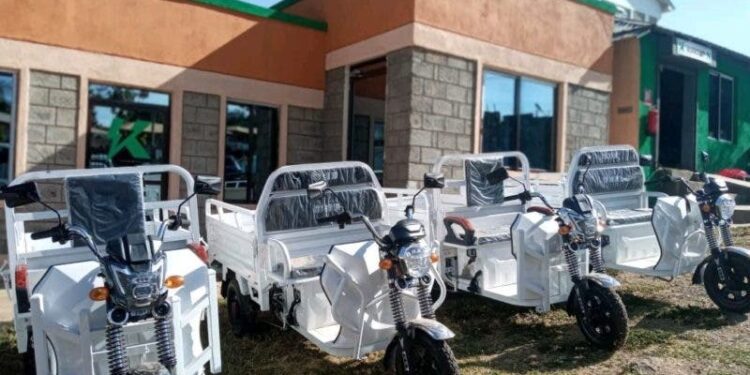Kiri EV is an electric vehicle startup based in Nairobi, Kenya, founded by Christopher Mukiri Maara. The company is revolutionizing the transportation industry in Africa with its innovative electric 2- and 3-wheelers, public and private charging and swap stations, and after-sales support. Kiri EV has recently completed the assembly of the first batch of electric cargo tuk tuks, which are being used for last mile deliveries in the Kakuma refugee camp.
Kiri EV is leading the way in providing sustainable transportation solutions to African countries. The electric cargo tuk tuks come in two variants, one with a 1,500 W motor and the other with a 3,000 W motor. They have a top speed limited to 50km/h, and their range is 70km. Charging the 8.64 kWh battery takes approximately 6 hrs. Kiri EV has used 72v30ah x 4 lithium packs for the tuk tuk.
The pilot program with Tryke in the Kakuma refugee camp is just the beginning of Kiri EV’s mission to provide sustainable transportation solutions to African countries. The electric cargo tuk tuks are perfect for applications such as delivering water, foodstuff, cooking gas cylinders, and general last mile transport from shop to customer. These tuk tuks enable people in remote areas to maneuver comfortably in environments where larger vehicles such as cars and trucks would not be quite applicable due to the lack of adequate road infrastructure.
Kiri EV is paving the way for a more sustainable future in Africa. With its innovative electric vehicles, public and private charging and swap stations, and after-sales support, Kiri EV is providing holistic end-to-end services that ensure customers get the full potential of their electric vehicles. The company is also working to integrate distributed solar systems such as rural mini grids into these off-grid environments to further increase the number of areas where electric tuk tuks can be used. Kiri EV is truly revolutionizing the transportation industry in Africa.
FAQ
Q1. How electric car chargers work?
A1. Electric car chargers work by connecting to an electrical outlet and providing power to the car’s battery. The charger then converts the electricity into a form that the car’s battery can use.
Q2. What electric car has the longest range?
A2. The Tesla Model S has the longest range of any electric car currently on the market, with a range of up to 370 miles on a single charge.
Q3. How electric car batteries are recycled?
A3. Electric car batteries are recycled by breaking them down into their component parts and then separating out the metals, plastics, and other materials for reuse. The metals are melted down and reused in new products, while the plastics and other materials are recycled into new products.





